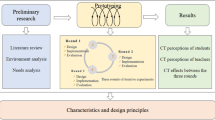Abstract
In our Computing with Emil project, currently in its 4th year, we are engaged in the design and research focused on productive constructionist learning of programming at the primary level, as a continuum from year to year. We are exclusively concerned with computing for all learners approach, being implemented by generalist primary teachers in their own classes. For similar purposes, national curricula usually list computational concepts, which pupils should learn and, in general agreement among educational experts, are considered developmentally appropriate for the primary school. However, in our work, we feel the vocabulary being normally used for this is too coarse-grained to clearly specify the learning goals, especially in the area of programming. Therefore, for each computational concept, we try to identify a set of related operations that primary pupils should learn in any particular year. In this research, we tried to verify whether our approach is comprehensible for teachers and prolific in outcomes for their pupils. We wanted to find out whether they realise that (a) different operations performed with each concept have different cognitive demands, and (b) these demands determine the arrangement of activities in an intervention. We addressed a large group of teachers who had already participated in our professional development sessions on the intervention for Year 3. We chose repetition as one of the concepts and designed six assessment tasks focused on various operations that pupils perform with it. We did not inform them of how we rank the tasks; we asked them to solve them and rank from the simplest to the most difficult, and explain their decision. We analysed the collected data by various methods, and in the paper, we discuss our findings. Teachers correctly distinguished different operations and helped us better understand challenges of projecting and assessing conceptual understanding.
Access this chapter
Tax calculation will be finalised at checkout
Purchases are for personal use only
Similar content being viewed by others
Notes
- 1.
That is, one day session of face to face or two afternoons in the online model.
- 2.
Familiar with our approach and our interventions.
- 3.
More precisely, tau = (n – 2 * m) / n, where n is the minimal number of swaps needed in the worst case and m is the minimal number of necessary swaps for this particular tuple.
References
Sentence, S.: Moving to mainstream: developing computing for all. In: Proceedings of the WiPSCE 2019 (2019). https://doi.org/10.1145/3361721.3362117
Blackwell, A.F.: What is programming? In: 14th Annual Workshop of Psychology of Programming Interest Group, pp. 204–218 (2002)
Department for Education: National curriculum in England: computing programmes of study (2013). www.gov.uk/government/publications
Gujberova, M., Kalas, I.: Designing productive gradations of tasks in primary programming education. In: Proceedings of the WiPSCE 2013, pp. 109–118. ACM, Aarhus (2013)
Kalas, I., Benton, L.: Defining procedures in early computing education. In: Tatnall, A., Webb, M. (eds.) WCCE 2017. IAICT, vol. 515, pp. 567–578. Springer, Cham (2017). https://doi.org/10.1007/978-3-319-74310-3_57
Plomp, T., Nieveen, N. (eds.): Educational Design Research. Part A: An Introduction. SLO, Enschede (2013)
CSTA and ACM: Computer Science K-8: Building a Strong Foundation (2012)
MŠMT: Rámcový vzdělávací program pro základní vzdělávání, Praha (2021)
Bers, M.U.: Coding, playgrounds and literacy in early childhood education: the development of KIBO robotics and ScratchJr. In: Proceedings of the 2018 IEEE Global Engineering Education Conference (EDUCAN), pp. 2094–2102 (2018)
Brennan, K., Resnick, M.: New frameworks for studying and assessing the development of computational thinking. In: Proceedings of the 2012 Annual Meeting of the American Edu Research Association, Vancouver (2012)
Meerbaum-Salant, O., Armoni, M., Ben-Ari, M.: Learning computer science concepts with Scratch. Comput. Sci. Educ. 23(3), 239–264 (2013)
CSTA: K-12 Computer Science Standards, Revised 2017 (2017). www.csteachers.org/page/standards
Dagiene, V., Hromkovic, J., Lacher, R.: Designing informatics curriculum for K-12 education: from concepts to implementations. Inf. Educ. 20(3), 333–360 (2021)
Perlman, R.: Using Computer Technology to Provide a Creative Learning Environment for Preschool Children. AI Memo 360. MIT, Cambridge (1976)
Morgado, L., Cruz, M., Kahn, K.: Radia Perlman: a pioneer of young children computer programming. In: Current Developments in Technology-Assisted Education, pp. 1903–1908. Formatex, Badajos (2006)
Kalas, I., Blaho, A., Moravcik, M.: Exploring control in early computing education. In: Pozdniakov, S.N., Dagienė, V. (eds.) ISSEP 2018. LNCS, vol. 11169, pp. 3–16. Springer, Cham (2018). https://doi.org/10.1007/978-3-030-02750-6_1
Benton, L., Hoyles, C., Kalas, I., Noss, R.: Bridging primary programming and mathematics: some findings of design research in England. Digit. Experiences in Math. Educ. 3(2), 115–138 (2017). https://doi.org/10.1007/s40751-017-0028-x
Cohen, L., Manion, L., Morrison, K.: Research Methods in Education. Routledge, London (2017)
Webb, M., et al.: Moving on with informatics/computer science curricula – challenges and opportunities. In: Symposium Presented at IFIP TC3 OCCE 2021 DTEL (2021)
Acknowledgments
This work has been funded in part by VEGA Slovak Agency under project Productive gradation of computational concepts in programming in primary school 1/0602/20.
Author information
Authors and Affiliations
Corresponding author
Editor information
Editors and Affiliations
Rights and permissions
Copyright information
© 2022 IFIP International Federation for Information Processing
About this paper
Cite this paper
Kalaš, I., Horvathova, K. (2022). Programming Concepts in Lower Primary Years and Their Cognitive Demands. In: Passey, D., Leahy, D., Williams, L., Holvikivi, J., Ruohonen, M. (eds) Digital Transformation of Education and Learning - Past, Present and Future. OCCE 2021. IFIP Advances in Information and Communication Technology, vol 642. Springer, Cham. https://doi.org/10.1007/978-3-030-97986-7_3
Download citation
DOI: https://doi.org/10.1007/978-3-030-97986-7_3
Published:
Publisher Name: Springer, Cham
Print ISBN: 978-3-030-97985-0
Online ISBN: 978-3-030-97986-7
eBook Packages: Computer ScienceComputer Science (R0)





